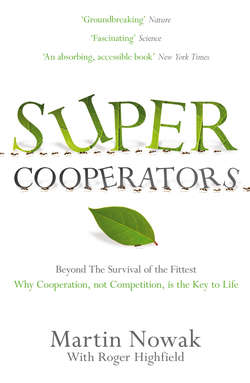SuperCooperators

Реклама. ООО «ЛитРес», ИНН: 7719571260.
Оглавление
Roger Highfield. SuperCooperators
CONTENTS
The Struggle
BEYOND COOPERATION
The Prisoner’s Dilemma
PRISONER OF THE DILEMMA
INCARCERATION
QUEST FOR THE EVOLUTION. OF COOPERATION
Direct Reciprocity— Tit for Tat
RECIPROCITY RULES
THE ITERATED DILEMMA
NOISE
TAKE ADVANTAGE OF MISTAKES
GOODBYE VIENNA
SOARING EAGLES, DIVING STRATEGIES
DILEMMA PAST, DILEMMA FUTURE
Indirect Reciprocity— Power of Reputation
BRAINPOWER AND INDIRECT RECIPROCITY
KAHLENBERG
FROM REPUTATION TO COOPERATION
THE EVIDENCE
THE MORAL SPECTRUM
STILL WALKING IN THE WIENERWALD
Spatial Games— Chessboard of Life
THE GOD GAME
SPATIAL GAMES
Group Selection— Tribal Wars
WHEN TWO TRIBES GO TO WAR
MATHEMATICS OF GROUP SELECTION
GROUPS AT WORK
THE RISE OF MULTILEVEL SELECTION
Kin Selection—Nepotism
THE MATH OF KIN SELECTION
THE DECLINE OF INCLUSIVE FITNESS
Prelife
PASSAGE TO PARADISE
THE PROBLEM OF LIFE
WHAT NEXT?
PLAYING THE GAME OF LIFE
ERROR LIMITATIONS
HYPERCYCLE
CHEATS
ALIEN THOUGHT
Society of Cells
WHEN COOPERATION FAILS
MUTATIONS
HOW TO RESTORE COOPERATION
The Lord of the Ants
RISE OF THE SUPERORGANISM
ANT WONDERS
SUPER NATURALIST
FROM ANTS TO SOCIOBIOLOGY
SPRING-LOADED SOCIETY
GENESIS OF SUPERORGANISMS
The Gift of the Gab
INSPIRATIONAL DUCK
OXFORD DUSK
LANGUAGE, LIFE, AND PRINCETON
THE BIG BANG OF LANGUAGE
THE LANGUAGE GAME
A LIFE OF SOAP OPERA
IN SEARCH OF GRAMMAR
WORDS IN THE HOURGLASS
THE FUTURE OF CULTURE
THE LANGUAGE INSTINCT
Public Goods
THE TRAGEDY
CRUELTY AND KILLING
THE POPULATION PROBLEM
THE PUBLIC GOODS GAME
THE CLIMATE GAME
GAME THEORY CAN SAVE THE WORLD
THE POWER OF REPUTATION
HARNESSING REPUTATION
Punish and Perish
COSTLY PUNISHMENT
WINNERS DON’T PUNISH
REWARD IS BETTER THAN PUNISHMENT
ANTISOCIAL PUNISHMENT
THE POINT OF PUNISHMENT
How Many Friends Are Too Many?
BRIEF HISTORY OF NETWORKS
ONLY CONNECT
EVOLVING NETWORKS
NETWORK GAMES
Game, Set, and Match
A NEW DAWN
TRENDSETTING
COOPERATIVE DILEMMAS
GEOMETRY OF COOPERATION
Crescendo of Cooperation
MECHANICS OF COOPERATION
THE NEXT STEP FOR MANKIND
THE ETERNAL SYMPHONY
Acknowledgments
References and Further Reading. Chapter 0: The Prisoner’s Dilemma. References
Books and Reports
Chapter 1: Direct Reciprocity—Tit for Tat. References
Books and Reports
Websites
Emails
Chapter 2: Indirect Reciprocity—The Power of Reputaton. References
Books and Reports
Websites
Chapter 3: Spacial Games—Chessboard of Life. References
Books and Reports
Articles
Websites
Interviews
Chapter 4: Group Selection—Tribal Wars. References
Books and Reports
Websites
Interviews
Chapter 5: Kin Selection—Nepotism. References
Books and Reports
Articles
Emails
Chapter 6: Prelife. References
Books and Reports
Chapter 7: Society of Cells. References
Books
Websites
Chapter 8: The Lord of the Ants. References
Books and Reports
Interviews
Chapter 9: The Gift of the Gab. References
Books and Reports
Interviews
Chapter 10: Public Goods. References
Books and reports
Interviews
Websites
Chapter 11: Punish and Perish. References
Books
Chapter 12: How Many Friends Are Too Many? References
Books
Articles
Chapter 13: Game, Set, and Match. References
Books
Interviews
Chapter 14: Crescendo of Cooperation
References
Books
Websites
Index
By the Same Author
About the Authors
Copyright
Отрывок из книги
Title Page
Dedication
.....
The modern understanding of the process of inheritance is now called “Mendelian,” in honor of Gregor Mendel, who had settled for being a monk after failing his botany exams at the University of Vienna. By sorting out the results of crossing round and wrinkly peas, Mendel revealed that inheritance is “particulate” rather than “blending.” Offspring inherit individual instructions (genes) from their parents such that round and wrinkly parents produce either round or wrinkly offspring and not something in between. What is often overlooked in his story is that Mendel was a good student of mathematics. The great geneticist and statistician Sir Ronald Fisher went so far as to call him “a mathematician with an interest in biology.” Mendel uncovered these rules of inheritance because he was motivated by a clear mathematical hypothesis, even to the extent of ignoring ambiguous results that did not fit. Had Mendel conducted an open-minded statistical analysis of his results, he might not have been successful.
A simple equation to show the effect of passing genes down the generations was found in 1908 by G. H. Hardy, a cricket-loving Cambridge mathematician who celebrated the artistry of his subject in his timeless book A Mathematician’s Apology. In an unusual reversal of the usual roles, the work of this pure mathematician was generalized by the German doctor Wilhelm Weinberg to show the incidence of genes in a population. Robert May (now Lord May of Oxford) once went so far as to call the Hardy-Weinberg law biology’s equivalent of Newton’s first law. Thanks to Hardy and Weinberg we now had a mathematical law that applied across a spectrum of living things.
.....